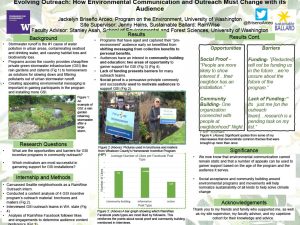Evolving Communication: How Environmental Outreach Must Change With Its Audience
Green stormwater infrastructure (GSI) incentive programs depend on public participation and social acceptance of GSI to fulfil their objectives. Program objectives include installing rain gardens and cisterns on private property to capture stormwater run-off and prevent it from entering and polluting nearby water bodies. The aim of this study was to determine how GSI incentive programs are being marketed to communities and which methods are most effective in garnering public participation in the programs. I interned with Sustainable Ballard; a community organization tasked with conducting outreach and education on green infrastructure by doorbelling in the North Seattle area. In addition to my internship duties, I conducted a content analysis of GSI incentive program primary outreach material like brochures and mailers for common themes and appeals to persuasion. I then interviewed these organizations to determine the success of their programs and how it related to their outreach methods. I found that as GSI programs age, appeals to personal benefits rather than collective environmental benefits are more successful since they reach a wider audience of people who are not already environmentally conscious. Additionally, through an analysis of program Facebook likes and engagement, I determined that different audiences have different desires from GSI programs, with established members desiring community building content from the programs. This means that GSI incentive programs should evolve their outreach to focus on personal benefits to the homeowner as the programs age, instead of collective environmental benefits which are not as widely appealing.
